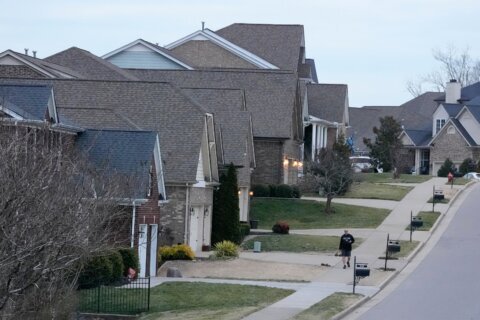If you’re thinking about buying a home in Northern Virginia, don’t expect a return to super-low interest rates any time soon, and prepare to see fewer listings overall.
On the other hand, prices are expected to moderate slightly, and you probably won’t have to battle 10 other buyers and make an offer on the spot. You may even have time to sleep on your decision.
That’s according to a new forecast from the Northern Virginia Area Realtors Association and George Mason University’s Center for Regional Analysis.
In many ways, after the red-hot boom years of 2020 and 2021 for residential real estate, the market seems to be returning to normal.
“I think we’ve definitely returned to a normal market,” said Reggie Copeland, with CR Copeland, and the realtors association president, during a panel discussion Wednesday. “And there are a lot of realtors, and consumers that are relieved, because it was a challenge. It was a challenge working with buyers; it was a challenge working with sellers. And quite honestly, it was a challenge working with other realtors, just because of the demand. Normalcy is OK — we need it.”
High mortgage rates: New normal
If you’re planning to buy, be prepared: Higher mortgage rates are likely here to stay.
Nationally, the 30-year fixed rate swelled past 7% last month — more than four points higher than a year ago — before falling slightly. Higher mortgage rates eat into a buyer’s purchasing power.
Terry Clower, with the Center for Regional Analysis, said he expects rates to stay within the 6% to 6.75% range to finish out the year.
“We’re probably nowhere in the near future, going back to a 2 and 1/2% 15-year mortgage, or a 3.25% 30-year mortgage … and it’s going to take some time for people that are in the market to just get adjusted to that new reality,” Clower said.
Casey Menish, with Pearson Smith Realty, added that it’s “especially hard for buyers that started looking in January, February, see what their rates could have been and kind of what they are now.”
That’s why it’s important for buyers to be thinking more long-term upfront.
“This might not be a house that you buy and you sell 18 months from now,” she said. “Is it a property that you can stay in for five-plus years? Is it a property that you could turn around and keep as an investment property if you outgrow it, or if your job changes? So thinking a little bit more long term (is) an important part of that conversation with clients.”
The forecast also calls for about a 19% drop in inventory, Clower said, in part because “folks that have that really cheap mortgage aren’t going to want to sell.”
In addition, the real estate forecast calls for a 12% overall drop in sales: “But that’s not going to mean that prices are going to come down,” Clower added. “Prices will stay pretty stable.”
While the average sale price in recent years has been higher than the list price, “What we’re seeing now is that it’s fallen below that 100% of original list price,” Clower said, adding, “But it’s just falling back to what would be a more normal market.”
In a lot of ways, Menish said, the current market resembles pre-pandemic 2019 or 2018 markets. That means sellers may not have the choice of 10 different offers who are willing to waive every contingency.
“So now we’re back in home inspection negotiations, we’re back in appraisals,” Menish said.
As for buyers?
“A buyer can actually think about whether they want to buy a house and have the night to sleep on it, versus having to make a decision right there,” she added. “I think it’s healthy to get back to what we’re kind of calling more of a normal market.”
With dark clouds potentially gathering on the economic horizon, Clower said it’s hard to pinpoint exactly where the economy is headed, but there seems to be agreement overall that some degree of recession looks likely.
“I am hopeful that it will be a relatively mild recession,” Clower said. But because of the “underpinning” of federal government spending, “we are not going to be in bad shape here,” he added.
In fact, the outlook calls for about 30,000 new jobs in the D.C. region next year — which in turn adds to demand in the housing market.







